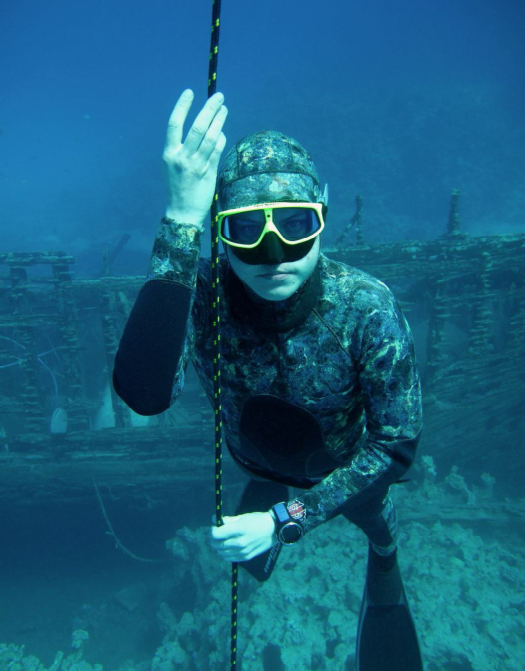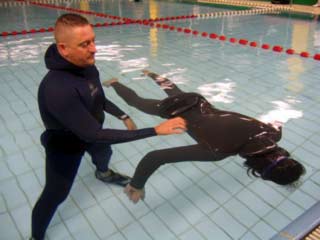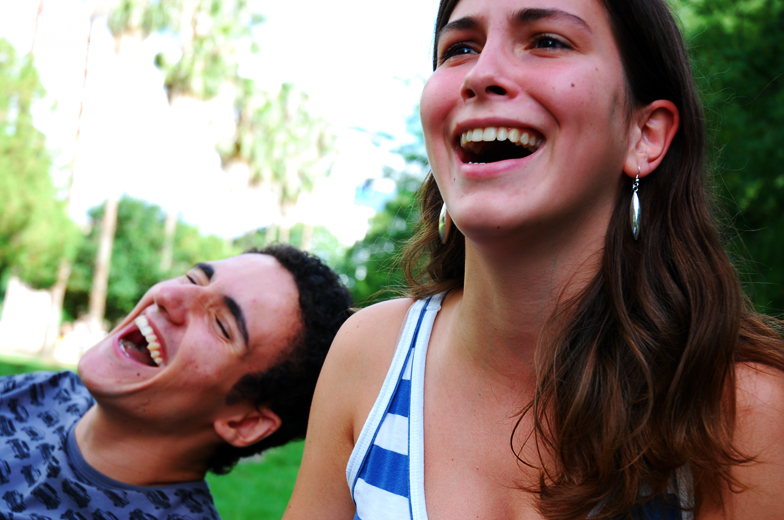|
Ulf Dextegen
Ulf Dextegen (born 16 November 1960) is a Swedish hypnotherapist and champion freediver (national records in 2008, 2009, 2011, 2012, 2013 with 8 minutes 43 seconds in static apnea, and bronze medals in 2009 and 2011 world championships. Personal best in training: 9 minutes 11 seconds). Dextegen is known for experimenting with altered states of consciousness through hypnosis and self-hypnosis. After an episode of being successfully treated from stress, he became interested in hypnosis in 2006. Completing initial training courses in hypnosis and freediving, Dextegen used static apnea to check the efficiency of the altered state of consciousness in education and sports. Despite being a 40+ years old office worker with an average lung capacity, he made the experience even more challenging by excluding any special diet or excessive lifestyle restrictions and exercises. In two years of practicing a combination of static apnea and self-hypnosis, Dextegen went from beginner to national ... [...More Info...] [...Related Items...] OR: [Wikipedia] [Google] [Baidu] |
Diving (sport)
Diving is the sport of jumping or falling into water from a Diving platform, platform or springboard, usually while performing acrobatics. Diving is an internationally recognised sport that is part of the Olympic Games. In addition, unstructured and non-competitive diving is a recreational pastime. Competitors possess many of the same characteristics as gymnastics, gymnasts and dancers, including strength, flexibility, kinaesthetic judgement and air awareness. Some professional divers were originally gymnasts or dancers as both the sports have similar characteristics to diving. Dmitri Sautin holds the record for most Olympic diving medals won, by winning eight medals in total between 1992 and 2008. History Antiquity In the Tomb of Hunting and Fishing there is a wall painting from around 530 - 500 BCE that shows a person climbing rocks towards a cliff face and a second person diving down the cliff face towards water. The Tomb of the Diver in Paestum, contains a fresco da ... [...More Info...] [...Related Items...] OR: [Wikipedia] [Google] [Baidu] |
Hypnotherapy
Hypnotherapy, also known as hypnotic medicine, is the use of hypnosis in psychotherapy. Hypnotherapy is generally not considered to be based on scientific evidence, and is rarely recommended in clinical practice guidelines. However, several psychological reviews and meta-analyses suggest that hypnotherapy can be effective as an adjunctive treatment for a number of disorders, including chronic and acute pain, irritable bowel syndrome, post-traumatic stress disorder (PTSD), phobias, and some eating disorders. Definition The United States Department of Labor's '' Dictionary of Occupational Titles'' (DOT) describes the job of the hypnotherapist:"Induces hypnotic state in client to increase motivation or alter behavior patterns: Consults with client to determine nature of problem. Prepares client to enter hypnotic state by explaining how hypnosis works and what client will experience. Tests subject to determine degree of physical and emotional suggestibility. Induces hypnotic st ... [...More Info...] [...Related Items...] OR: [Wikipedia] [Google] [Baidu] |
Freediving
Freediving, free-diving, free diving, breath-hold diving, or skin diving, is a mode of underwater diving that relies on breath-holding until resurfacing rather than the use of breathing apparatus such as scuba gear. Besides the limits of breath-hold, immersion in water and exposure to high ambient pressure also have physiological effects that limit the depths and duration possible in freediving. Examples of freediving activities are traditional fishing techniques, competitive and non-competitive freediving, competitive and non-competitive spearfishing and freediving photography, synchronised swimming, underwater football, underwater rugby, underwater hockey, underwater target shooting and snorkeling. There are also a range of "competitive apnea" disciplines; in which competitors attempt to attain great depths, times, or distances on a single breath. Historically, the term ''free diving'' was also used to refer to scuba diving, due to the freedom of movement compared wi ... [...More Info...] [...Related Items...] OR: [Wikipedia] [Google] [Baidu] |
Static Apnea
Static apnea (STA) is a discipline in which a person holds their breath (apnea) underwater for as long as possible, and need not swim any distance. Static apnea is defined by the International Association for Development of Apnea (AIDA International) and is distinguished from the Guinness World Record for breath holding underwater, which allows the use of oxygen in preparation. It requires that the respiratory tract be immersed, with the body either in the water or at the surface, and may be performed in a pool or open water (sea, lake, river, etc.). Static apnea is the only AIDA International discipline measuring duration, and one of the three disciplines considered for the international competitions by team, with constant weight and dynamic with fins. Beta blockers (doping in sport of freediving; prolong every type of apnea by reducing heart rate, blood pressure Blood pressure (BP) is the pressure of Circulatory system, circulating blood against the walls of blood ve ... [...More Info...] [...Related Items...] OR: [Wikipedia] [Google] [Baidu] |
Altered State Of Consciousness
An altered state of consciousness (ASC), also called an altered state of mind, altered mental status (AMS) or mind alteration, is any condition which is significantly different from a normal waking state. It describes induced changes in one's mental state, almost always temporary. A synonymous phrase is "altered state of awareness". History By 1892, the expression was in use in relation to hypnosis, though there is an ongoing debate as to whether hypnosis is to be identified as an ASC according to its modern definition. The next retrievable instance, by Max Mailhouse from his 1904 presentation to conference, however, is unequivocally identified as such, as it was in relation to epilepsy, and is still used today. In academia, the expression was used as early as 1966 by Arnold M. Ludwig and brought into common usage from 1969 by Charles Tart. Definitions There is no general definition of an altered state of consciousness, as any definitional attempt would first have to rely ... [...More Info...] [...Related Items...] OR: [Wikipedia] [Google] [Baidu] |
Self-hypnosis
Self-hypnosis or auto-hypnosis (as distinct from hetero-hypnosis) is a form, a process, or the result of a self-induced hypnotic state. Frequently, self-hypnosis is used as a vehicle to enhance the efficacy of self-suggestion; and, in such cases, the subject "plays the dual role of suggester and suggestee". The nature of the auto-suggestive practice may be, at one extreme, "''concentrative''", wherein "all attention is so totally focused on (the words of the auto-suggestive formula, e.g. "Every day, in every way, I'm getting better and better") that everything else is kept out of awareness" and, at the other, "''inclusive''", wherein subjects "allow all kinds of thoughts, emotions, memories, and the like to drift into their consciousness". Typological distinctions From their extensive investigations, Erika Fromm and Stephen Kahn (1990) identified significant and distinctive differences between the application of the wide variety of practices that lie within the domain commonl ... [...More Info...] [...Related Items...] OR: [Wikipedia] [Google] [Baidu] |
Stress (psychological)
In psychology, stress is a feeling of emotional strain and pressure. Stress is a form of psychological and mental discomfort. Small amounts of stress may be beneficial, as it can improve athletic performance, motivation and reaction to the environment. Excessive amounts of stress, however, can increase the risk of strokes, heart attacks, ulcers, and mental illnesses such as depression and also aggravate pre-existing conditions. Psychological stress can be external and related to the environment, but may also be caused by internal perceptions that cause an individual to experience anxiety or other negative emotions surrounding a situation, such as pressure, discomfort, etc., which they then deem stressful. Hans Selye (1974) proposed four variations of stress. On one axis he locates good stress ( eustress) and bad stress (distress). On the other is over-stress (hyperstress) and understress (hypostress). Selye advocates balancing these: the ultimate goal would be to balance h ... [...More Info...] [...Related Items...] OR: [Wikipedia] [Google] [Baidu] |
Lung Volumes
Lung volumes and lung capacities are measures of the volume of air in the lungs at different phases of the respiratory cycle. The average total lung capacity of an adult human male is about 6 litres of air. Tidal breathing is normal, resting breathing; the tidal volume is the volume of air that is inhaled or exhaled in only a single such breath. The average human respiratory rate is 30–60 breaths per minute at birth, decreasing to 12–20 breaths per minute in adults. Factors affecting volumes Several factors affect lung volumes; some can be controlled, and some cannot be controlled. Lung volumes vary with different people as follows: A person who is born and lives at sea level will develop a slightly smaller lung capacity than a person who spends their life at a high altitude. This is because the partial pressure of oxygen is lower at higher altitude which, as a result means that oxygen less readily diffuses into the bloodstream. In response to higher altitude, the body's ... [...More Info...] [...Related Items...] OR: [Wikipedia] [Google] [Baidu] |
AIDA International
Association Internationale pour le Développement de l'Apnée (AIDA) (English: ''International Association for the Development of Apnea'') is a worldwide rule- and record-keeping body for competitive breath holding events, also known as freediving. It sets standards for safety, comparability of Official World Record attempts and freedive education. AIDA International is the parent organization for national clubs of the same name. AIDA World Championships are periodically held. History AIDA was founded on November 2, 1992, in Nice, France, by Frenchmen Roland Specker, Loïc Leferme and Claude Chapuis, with Specker as its first president. The AIDA Competitions started to take form in 1993. National clubs begin to form over all Europe in 1994–1995. AIDA became AIDA International in 1999. * In 1999 Sébastien Nagel, of Switzerland, replaced Roland Specker as the president. * Bill Strömberg, of Sweden, replaced Sébastien Nagel as president in 2005. * Kimmo Lahtinen, of Finland ... [...More Info...] [...Related Items...] OR: [Wikipedia] [Google] [Baidu] |
Karolinska Institutet
The Karolinska Institute (KI; ; sometimes known as the (Royal) Caroline Institute in English) is a research-led medical university in Solna within the Stockholm urban area of Sweden and one of the foremost medical research institutes globally. The Nobel Assembly at the Karolinska Institute awards the Nobel Prize in Physiology or Medicine. The assembly consists of fifty professors from various medical disciplines at the university. The current vice-chancellor of Karolinska Institute is Annika Östman Wernerson, who took office in March 2023. The Karolinska Institute was founded in 1810 on the island of Kungsholmen on the west side of Stockholm; the main campus was relocated decades later to Solna, just outside Stockholm. A second campus was established more recently in Flemingsberg, Huddinge, south of Stockholm. The institute also has a Centre for Reparative Medicine, consisting of two nodes, one in Stockholm and one in Hong Kong. The Karolinska Institute is Sweden's third ... [...More Info...] [...Related Items...] OR: [Wikipedia] [Google] [Baidu] |
1960 Births
It is also known as the " Year of Africa" because of major events—particularly the independence of seventeen African nations—that focused global attention on the continent and intensified feelings of Pan-Africanism. Events January * January 1 – Cameroon becomes independent from France. * January 9– 11 – Aswan Dam construction begins in Egypt. * January 10 – British Prime Minister Harold Macmillan makes the "Wind of Change" speech for the first time, to little publicity, in Accra, Gold Coast (modern-day Ghana). * January 19 – A revised version of the Treaty of Mutual Cooperation and Security between the United States and Japan ("U.S.-Japan Security Treaty" or "''Anpo (jōyaku)''"), which allows U.S. troops to be based on Japanese soil, is signed in Washington, D.C. by Prime Minister Nobusuke Kishi and President Dwight D. Eisenhower. The new treaty is opposed by the massive Anpo protests in Japan. * January 21 ** Coalbrook mining disaster: A coal mine ... [...More Info...] [...Related Items...] OR: [Wikipedia] [Google] [Baidu] |
Living People
Purpose: Because living persons may suffer personal harm from inappropriate information, we should watch their articles carefully. By adding an article to this category, it marks them with a notice about sources whenever someone tries to edit them, to remind them of WP:BLP (biographies of living persons) policy that these articles must maintain a neutral point of view, maintain factual accuracy, and be properly sourced. Recent changes to these articles are listed on Special:RecentChangesLinked/Living people. Organization: This category should not be sub-categorized. Entries are generally sorted by family name In many societies, a surname, family name, or last name is the mostly hereditary portion of one's personal name that indicates one's family. It is typically combined with a given name to form the full name of a person, although several give .... Maintenance: Individuals of advanced age (over 90), for whom there has been no new documentation in the last ten ... [...More Info...] [...Related Items...] OR: [Wikipedia] [Google] [Baidu] |




